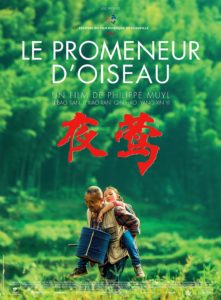The Nightingale
夜莺 | Le promeneur d’oiseau
China/France, 2013, colour, 2.35:1, 100 mins.
Director: Philippe Muyl.
Rating: 7/10.
Charmingly unaffected odd-couple road movie with an old man and his spoilt grand-daughter.
Beijing, the present day. For the past 18 years the widowed Zhu Zhigen (Li Baotian) has been living in the capital with only an ageing nightingale for company; each day he walks with it to the local park. His son, successful architect Zhu Chongyi (Qin Hao), hasn’t talked to him for four years and is about to be divorced by his wife, Qianying (Li Xiaoran), an equally busy executive. Zhu Zhigen decides it’s time to visit his home village in Guangxi province, southern China, with the nightingale he originally brought from there. With Zhu Chongyi away on a business trip to Hong Kong and Tokyo, and Qianying due to go to Paris, Zhu Zhigen offers to take along their young daughter, Zhu Renxing  (Yang Xinyi), as their maid/nanny is not available. The spoiled Zhu Renxing, who likes her urban comforts, objects; but she has no choice when Qianying agrees. Arriving by train in Guilin after a long journey, the pair accidentally take the wrong bus to Yangshuo and end up spending the night in a farmer’s house. Next day they start walking back to Guilin but get lost in the forest, where they spend the next night in a cave. Gradually, Zhu Renxing starts to enjoy the non-urban life and to bond with her grandfather. But then Zhu Chongyi returns early from his business trip and hears what has happened.
(Yang Xinyi), as their maid/nanny is not available. The spoiled Zhu Renxing, who likes her urban comforts, objects; but she has no choice when Qianying agrees. Arriving by train in Guilin after a long journey, the pair accidentally take the wrong bus to Yangshuo and end up spending the night in a farmer’s house. Next day they start walking back to Guilin but get lost in the forest, where they spend the next night in a cave. Gradually, Zhu Renxing starts to enjoy the non-urban life and to bond with her grandfather. But then Zhu Chongyi returns early from his business trip and hears what has happened.
REVIEW
A spoilt Beijing brat and her mellow old grandfather finally bond when lost in the wilds of Guangxi in The Nightingale 夜莺, a remake by French director Philippe Muyl, 60, of his decade-old The Butterfly Le papillon (2002). Swapping the spectacular Prealps scenery of the Vercors Plateau in southeast France for the hilly, verdant landscape around Guilin and Yangshuo in southern China is a fair enough trade; and Muyl manages to conjure up the same natural magic and easy charm as in the original, despite the move to another continent and culture. But Nightingale is more than just a remake with a few tweaks: Muyl, his Mainland co-writers and the strong cast make the film seem absolutely rooted in its setting rather than just an awkward European transplant, and also come up with a richer (if equally fanciful) product of their own.
In the original movie, the old man was a widowed butterfly-collector unrelated to the young girl, who tagged along by hiding in his car; in Nightingale, he’s a widower with a fondness for a pet bird who takes his grand-daughter along when he revisits his native village in the south. Just as Butterfly seemed tailor-made for veteran French actor Michel Serrault, then in his mid-70s, so Nightingale seems specially woven for Li Baotian 李保田, an equally authoritative actor but with a tougher edge. In the event, the Shandong-born Li soft-peddles his usual northern gruffness for a much gentler portrayal than Serrault’s grumpy widower: there’s never any doubt that he and the young girl are going to bond, as it’s clearly an odd-couple road movie, but it’s much less schematic than the original.
It’s a fine return to the big screen for the 67-year-old, theatre-trained actor who, following a run of remarkable film roles during the 1990s (Ju Dou 菊豆, 1990; Shanghai Triad 摇啊摇,摇到外婆桥, 1995; Keep Cool 有话好好说, 1997), has concentrated on TV, with the exception of the lead character in Courthouse on Horseback 马背上的法庭 (2006). His bird-fancying grandfather, estranged from his son and the latter’s yuppie Beijing lifestyle, is a quietly stubborn old man who gradually weans his princessy grand-daughter away from her computer and urban lifestyle towards the simpler pleasures of the countryside and village life, to which he hopes eventually to return for his dying days. There’s nothing especially original in the theme, but Muyl doesn’t push the material farther than it can stand, and the chemistry between Li and child actress Yang Xinyi 杨心仪 (after a string of roles in the past five years) doesn’t rely on them continually spatting. There’s hardly a false note in their character interplay, and Li gives Yang plenty of room to shine alongside him.
In another departure from the original, the parents get a larger share of the pie in Beijing scenes that bookend the movie. Again, there’s nothing new in the portrayal of two hard-edged city yuppies devoted to their careers in the New China, but Li Xiaoran 李小冉 (The Chinese Botanist’s Daughters Les filles du botaniste, 2006; Driverless 无人驾驶, 2010; Love Retake 爱情不NG, 2013) brings her usual elegance to the mother and Qin Hao (Spring Fever 春风沉醉的夜晚, 2009; Mystery 浮城谜事, 2012; Blind Massage 推拿, 2014) gives further proof of developing into a real actor, especially in his later scenes of rapprochement with his father. The ending is unashamedly feel-good, but handled with charm rather than gooeyness. Ace d.p. Sun Ming 孙明 (The Seal of Love 秋之白华, 2011; An End to Killing 止杀, 2012) scales back his usual tendency towards lushness with cleanly shot widescreen images that show the Guilin region of Guangxi province in an untouristy way, as well as avoiding the usual French tendancy towards exoticism.
The film is the second official China-France co-production under the treaty that was finally signed in 2010. Muyl’s Butterfly was a notable success when released in China in 2005.
CREDITS
Presented by Lightshades Film Productions (CN), Stellar Mega Films (CN), Envision Films (CN), Pan Eurasia Films (FR). Produced by Stellar Mega Films (CN), Envision Films (CN), Pan Eurasia Films (FR).
Script: Philippe Muyl, Ning Ning. Adaptation: Philippe Muyl, Cong Xiao. Photography: Sun Ming. Editing: Kako Kelber, Manu De Sousa. Music: Armand Amar. Art direction: Li Wenbo. Costumes: Wang Ling. Sound: Yves Osmu, Jérôme Coic, Patrice Grisolet, Dominique Gaboreau.
Cast: Li Baotian (Zhu Zhigen), Qin Hao (Zhu Chongyi), Li Xiaoran (Qianying), Yang Xinyi (Zhu Renxing), Li Ruiying (dance teacher).
Premiere: Busan Film Festival (A Window on Asian Cinema), 5 Oct 2013.
Release: China, 31 Oct 2014; France, 7 May 2014.
(Review originally published on Film Business Asia, 24 Feb 2014.)
